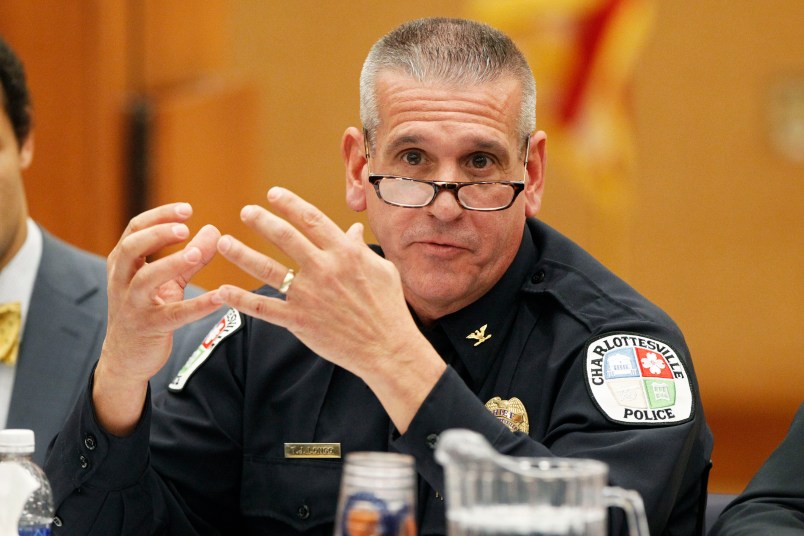Charlottesville, Va. police said Monday that an investigation had found no evidence an alleged gang rape that was described in a blockbuster Rolling Stone article actually took place at the University of Virginia’s Phi Kappa Psi fraternity.
But Charlottesville Police Chief Timothy Longo said the case was merely “suspended” — not closed — at this point. An external review of the Rolling Stone story, which unraveled after other news outlets discovered discrepancies in a student named “Jackie’s” account of her alleged rape, is expected to be published in early April.
Here are five key takeaways from the Charlottesville Police Department’s news conference.
Police don’t believe there was a party at Phi Kappa Psi the night Jackie said she was gang raped
Longo said the investigation uncovered no evidence to suggest there was a party at the Phi Kappa Psi house on Sept. 28, 2012, the night the Rolling Stone article stated Jackie was gang raped.
Phi Kappa Psi’s sister fraternity did hold a formal function that night, leading police to believe that the fraternity would not hold its own social event, Longo said.
In addition, Longo said police obtained a photograph that was timestamped about 11 p.m. that same night showing one frat member who stood alone in the Phi Kappa Psi house’s main room holding two chairs. That photo conflicted with the crowded party Jackie described in the Rolling Stone article.
Police couldn’t identify “Drew,” Jackie’s alleged rapist
Rolling Stone reported that Jackie’s rapist, a student identified as “Drew,” was a member of Phi Kappa Psi and knew Jackie through the university pool, where they both worked. Longo said police were unable to identify Drew.
Police also were unable to identify Haven Monahan, whom Jackie’s friends told police was the name of the person who took Jackie out on a date the night of her alleged rape. Longo said a phone number for Monahan that Jackie’s friends believed they had been texting was a Google number.
There was a third name that surfaced during the investigation of a student who did work at the aquatic center and belonged to a fraternity other than Phi Kappa Psi, Longo said. That student and other members of his fraternity had no information to offer in interviews with police about a sexual assault at their frat house, which differed in layout from the house Jackie described in the Rolling Stone article.
Jackie didn’t participate in the investigation, but reporter Sabrina Rubin Erdely did
Jackie agreed to meet with police about the investigation after the university’s Thanksgiving break. But when she arrived at the December meeting, flanked by a dean from the school and an attorney, Jackie declined to give a statement or answer questions, Longo said.
However, the article’s reporter, Sabrina Rubin Erdely — who went dark on social media at the end of November and stopped giving interviews about her Rolling Stone article — did participate in the investigation. Erdely gave an interview to police, although she “could not get into” some things without compromising her sources, Sgt. David Harris said.
“She was cooperative with us as best as she could be,” Harris said of Erdely.
Police are interested in two other alleged assaults at Phi Kappa Psi that Jackie referenced
Jackie brought up two other alleged sexual assaults at the Phi Kappa Psi frat house, one that she said took place in 2010 and another that she said occurred in 2014, in her conversations with the head of UVA’s Sexual Misconduct Board before the Rolling Stone story was published.
Longo said at this point police have no evidence to support those claims, but urged anyone who may have information about those alleged incidents to come forward.
The case may remain open indefinitely
Longo said he wasn’t planning to close the case because he couldn’t prove that something horrific didn’t happen to Jackie — and she, or someone else, may choose to come forward in the future with information pertaining to the alleged crime.
“I think it’s a disservice to Jackie. I think it’s a disservice, frankly, to the university to simply close this without at least allowing an opportunity so that if additional information comes forward we are able to further investigate it,” he said.
Asked how long he planned to keep the investigation open, Longo said there was no statute of limitations that would force police to shut down a probe into an alleged rape.







This unfortunate hoax makes it more difficult for actual rape survivors to come forward. That’s the real problem with the Rolling Stone’s shoddy reporting.
I think the other problem is “Jackie’s” witnesses believed that something happened. Something really bad. Too bad she wasn’t a “perfect” victim and that the reporter kind of ran with it w/o verifying the details.
“Longo said he wasn’t planning to close the case because he couldn’t prove that something horrific didn’t happen to Jackie…”
So in order to maintain the primacy of female victimhood and avoid any accusation of misogyny, the conceit is now that the lack of cannot prove that a crime was not committed. In what other situation is a person, man or woman, allowed to make false, incendiary claims of a crime, which can very readily be disproven, and be so coddled and pitied?
Oh, please.
Turn on Fox News and watch for 15 minutes.
Would you like a string of pearls and some smelling salts to go with your fainting couch?
Ahh… I love the smell of masculinist victimhood in the morning, or at any time…